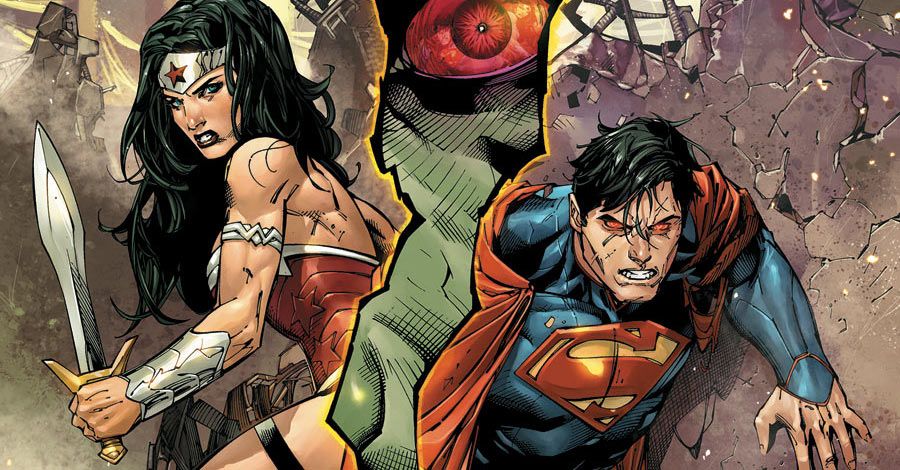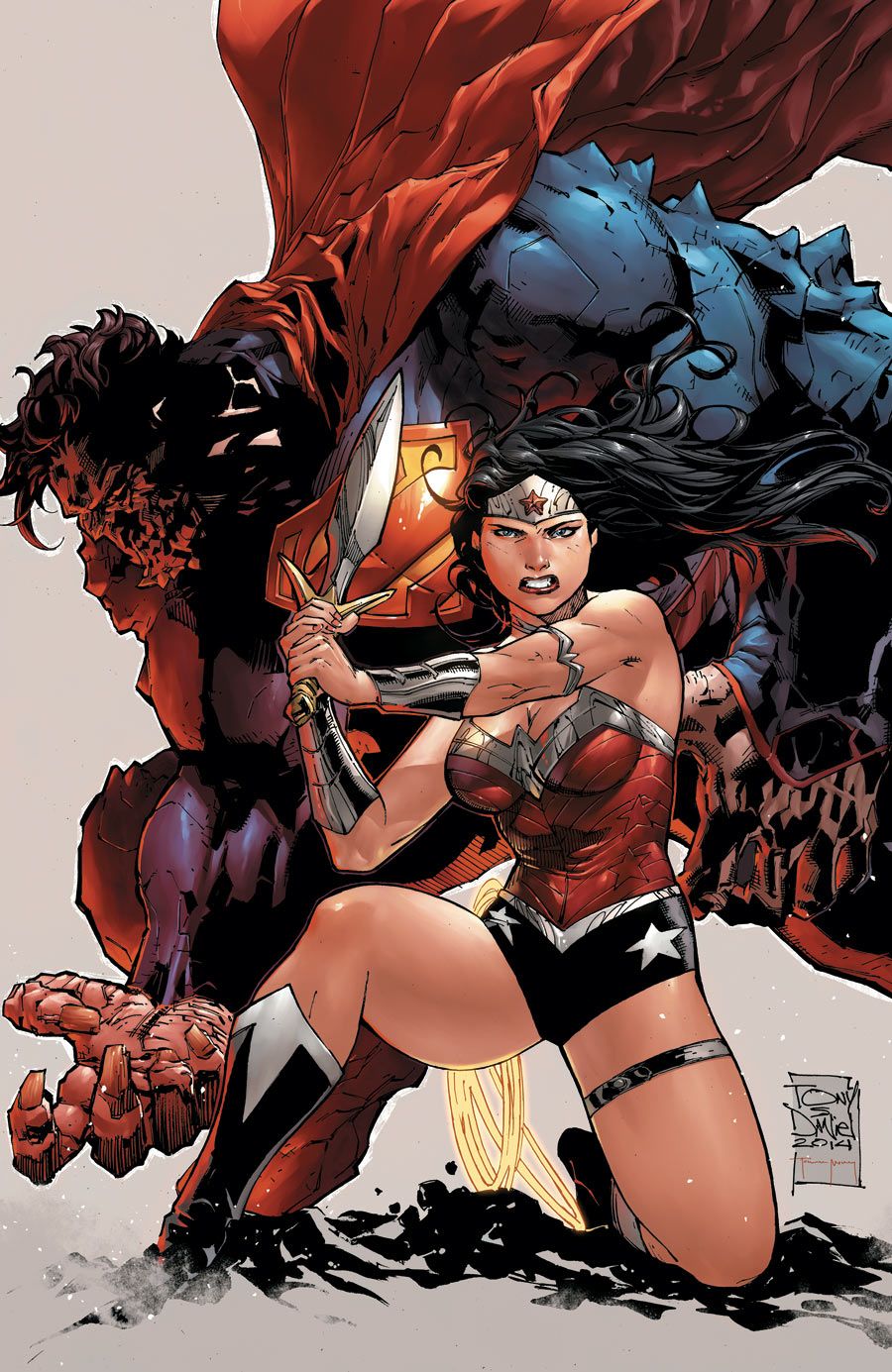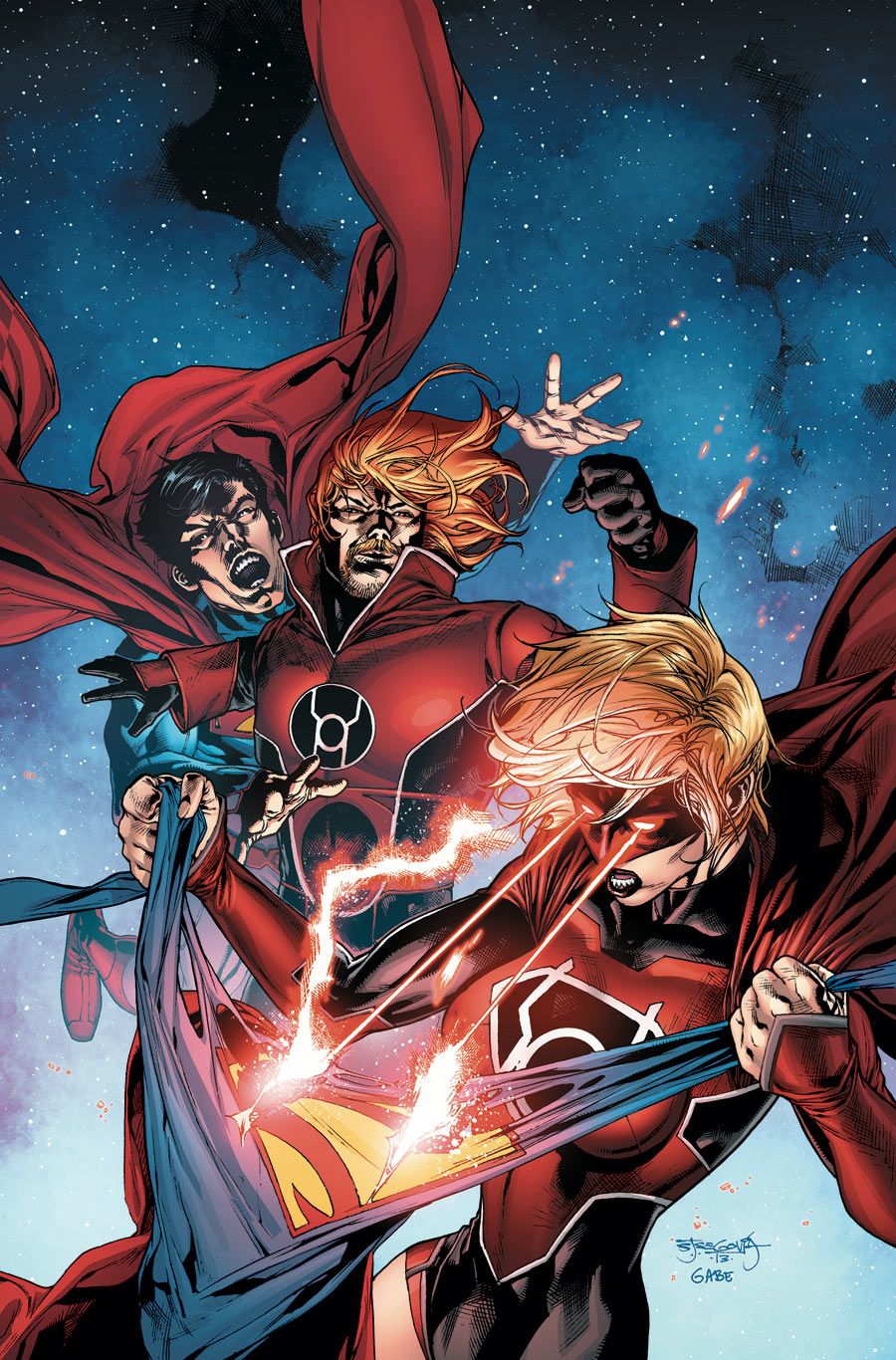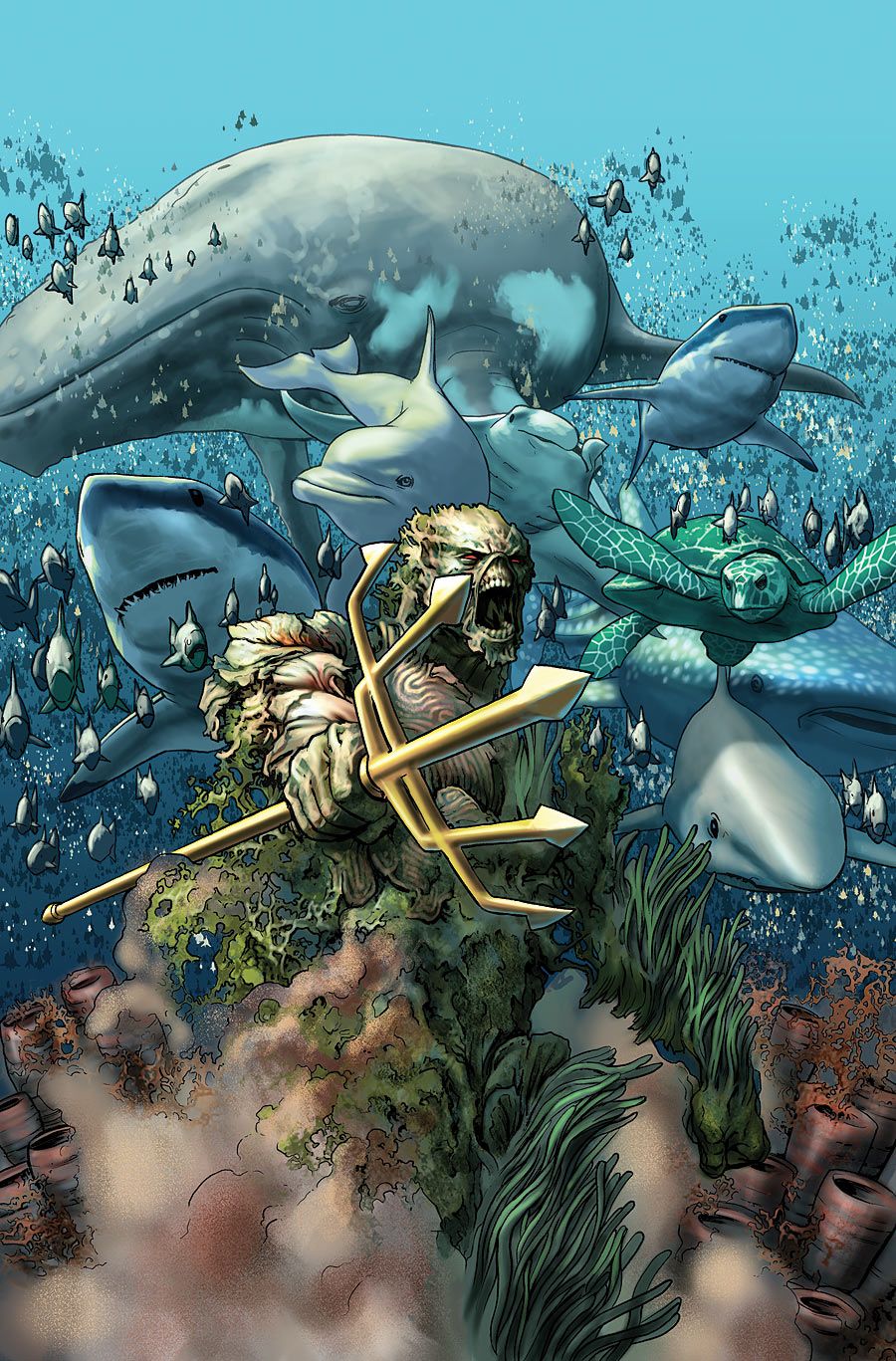Yes, Charles Soule has a lot going on. He's in the rare position of having a major presence at both Marvel and DC Comics, writing "Inhuman," "She-Hulk" and "Thunderbolts" for the former (his "T-Bolts" run wraps up with May's issue #26); and "Superman/Wonder Woman," "Red Lanterns" and "Swamp Thing" at the latter. On top of that, he's keeping his creator-owned roots firmly planted with the acclaimed "Letter 44" for Oni Press, which, according to rumors, has attracted interest as a TV show.
Soule, Pak & Lobdell: "Superman: Doomed" Is Not a Rehash of "Death of Superman"
But hard work is nothing new to Soule -- as has been well-publicized, he's also an attorney with his own practice. And it's the results of that effort that he's especially eager to talk about, the topic of his conversation with CBR News this past weekend at the DC Comics at Emerald City Comicon in Seattle, with a focus on the latest developments in his three current DC series.
CBR News: Charles, I'm sure you're tired of talking about how much stuff that you do, but it is notable, I think -- six monthly books.
Charles Soule: Seven.
On top of being a lawyer.
Yeah.
And having a family.
Yeah.
Any one of those things would keep a person busy -- have you always been especially good at time management and staying organized? I remember you wrote a blog post recently that seemed to try to demystify it all a bit.
This question is coming up again and again and again, and it's not a problem, because I think it's something that people are very interested in. It's a good thing that people want to know about this stuff. Part of it is, I love writing. I love writing these stories, working with these characters. It is literally a dream come true. Everything else that I would decide to do otherwise is not as appealing to me. Yeah, I like going to the movies and stuff like that, but I don't like wasting time. I never have. If I can be spending my available time on doing things that I think are fantastic, I'm going to do it. That's basically what it is.
That sounds like discipline, and probably something you had to be good at years before this.
Certainly the law career helped with that. You can't be a practicing attorney without being very disciplined and detail-oriented, and having good time management. I've had my own practice for more than 10 years at this point. That in particular requires you to be very disciplined and focused, because it's my business. If I don't do the work, I don't eat.
Let's get into the books, starting with "Superman/Wonder Woman" -- it was clear that some people had a distinct perception of that series before it even came out. Now that the actual work has come out, that notion has seemed to dissolve. How annoyed were you at that initial reaction, and do you think it's been satisfactorily overcome?
I don't think that's a "Superman/Wonder Woman" [thing]. I think whenever you have a new title announced that's something different that people haven't seen before, they like to put things in boxes, so they're like, "This is probably going to be this," and then people start talking about it that way. People like to talk about things. "Superman/Wonder Woman," people expected I guess a lot of romance, or maybe something that wasn't emotionally deep. Who knows?
Ultimately, it doesn't really matter, because the book is what the book is -- which is a huge superhero epic action book that happens to have a strong relationship at its core, between two of the coolest characters in the DC Universe. That's what it is, everybody knows what it is now, and it's going to stay in that vein. I'm very happy with the way the book's come together. This whole weekend, people have been coming up to my booth, being thrilled.
Those are two of the biggest characters in any type of fiction, being presented in a slightly different context, since there is the romance element, which hasn't really been there before. How much do you enjoy that blend of something that is so established, but in a way that people haven't seen?
I love it. Honestly, that is one of the things that attracted me to this project in the first place, because it was a chance to do something new with characters that everything has been done with, and that does not come along very often. So I jumped on it the minute it was offered. I feel like it's a responsibility, and it's something that I spend a lot of time trying to get right. I obsess over it in a way that I don't obsess over some of the other books, but hopefully that shows in the scripts and the finished product.
Doomsday has been a part of the book since the beginning, and things are now moving to the "Superman: Doomed" crossover. What interested you about Doomsday, and were you reading DC Comics during the original "Death of Superman" back in 1992?

Yes, I was, and that was one of the first big crossover events that really grabbed me as a kid. As far as Doomsday now, it's been more than 20 years since that happened, so this is a chance to take that storyline and subvert people's expectations of it a little bit. It's kind of like "Superman/Wonder Woman" itself -- people think it's going to be X, and we're going to do Y, Z, A, B, C, 1, 2, 3 -- a whole bunch of different things that they're not necessarily expecting to happen. Which is fun. It's part of the process of working on a big event like that. I'm working on it with Greg Pak and Scott Lobdell, and we've really come up with some cool stuff.
What's it like working with that team? You started with creator-owned stuff, which is very much your own vision, and doing stories for Marvel and DC is of course different than that, and with this, it looks like the three of you are working very closely together -- it's the old-style crossover where one part picks up where the other left off. What's that experience been like for you? It has to be a little different.
It is, but one of the things that's great is if you can get to the point where you trust your collaborators. I don't have to worry about it -- [Pak and Lobdell's] chapters are going to be great, and I can focus on what I'm doing. We started working on this in earnest last October. There's been a lot of development before any of us wrote a single script related to this. We've got whiteboards, we've got charts, we've got all kinds of stuff. It's pretty intricately plotted, and I think it's really going to come off well.
I feel that the three of you are each very different types of writers.
That's true.
I imagine that makes it more fun.
It's interesting! What that means is, you don't always agree on every single point. But that means there's some give and take, and that ideas really get vetted -- if they make it through to the finished product, they've got to be pretty good, because if you can convince the other guys that your take is the right take, even if they didn't necessarily start there, that means it's probably a decent idea.
With Doomsday, a lot of people have a specific reaction to that character as a negative product of the '90s. Is the mission statement at least partly to defy that?
It is. My real Doomsday experience prior to this was just the "Death" and "Return" story. I know that he came back a bunch of times, sort of with diminishing returns with each appearance. We're very aware of the history of Doomsday, and we're trying -- and I think succeeding -- in doing something that is going to be familiar in the ways you want it to feel familiar, but also new and cool and interesting in a way that makes it worth doing the event. That's really what everybody wants. They want to read something that feels like it's worth the time; that matters. That feels like they're taking on a journey by confident creators who know what they're doing, and that's what we've got.
Let's move to "Red Lanterns" -- that seems like a neat title to be on, because unlike everything we've just been saying, there really isn't much in the way of expectations for what that book means. It's been around for a couple of years, but it's a relatively new prospect, and it seems that you can do a lot there. Is that a big part of the attraction for you?
Yeah. I like Guy Gardner, personally. He's one of my favorite characters in the DCU, and the idea of writing a book built around him was a big deal for me. Supergirl just joined the team -- it's funny, they're not like a team in the traditional sense, they really are more like a gang. So she's become a part of the gang, and a lot of tension and conflict is happening. The last issue that just came out, Guy tries to pawn her off on Superman, and both she and Superman aren't particularly thrilled about that -- somebody gets hit with a tanker.
You get to do crazy things in "Red Lanterns," which is neat. It's open in that way. Sort of in a similar way to "Swamp Thing," except "Swamp Thing" leans more towards the supernatural aspect of things, and globetrotting, weird adventures. DC characters in general lend themselves to a lot of expansive topics. There are a lot of cool corners in the universe that you can explore with these books, and I'm fortunate that the three books that I'm on are all very different corners, so I get to write totally different kinds of stories. I
Let's focus a bit more on Supergirl in "Red Lanterns" -- it's an idea that sounds crazy at first, but then you think about it and it has a lot of fun potential. What inspired that, and how have you enjoyed seeing it through?
I will take credit for this one, for better or worse. At the Superman summit last October, when we were talking about the Superman line and building the "Doomed" crossover, we were talking about what to do with Supergirl. I was writing "Red Lanterns" at the time, and I'm like, "Why doesn't she join the team? I think she'd be a good fit, it'd be interesting, we could do something cool with her, build her up in a way and change her character around a little bit." Change is important to these characters -- you want to keep them familiar, but you also want to bring them to new places and do new things with them.
It seemed like this would really work, and as soon as I said it, people were like, "Huh, that could be OK!" It took a little time to put all the pieces together, but now it's humming. It's like "Superman/Wonder Woman" -- people weren't sure what to expect, but now that they're reading it, I've been hearing nothing but good things.
On a similar note, you've also had a lot of freedom with Guy Gardner, and putting that character in different places. Since you do like the character a lot, what has that process been like -- adding to the history of such a fan-favorite?
If you're going to write any character, you want to do something with him or her that has not really been done before -- so that at some point, hypothetically down the road, people can [say], "You know what I remember, when Charles Soule gave Guy Gardner a sweet mustache." Which is something I did, for better or worse.
I love doing that kind of thing with all of these characters, I'm going to keep doing it as long as I can, and I hope people keep following me on those journeys, which so far they have been.
Your third DC title is "Swamp Thing," the DC book you've been working on the longest. How have you been enjoying that path? It's not a character with as locked-in perceptions as Superman or Wonder Woman, but it's certainly a book with a very impressive creative history. What was it like stepping into that?
I love it. You mentioned the pedigree -- Alan Moore, Scott Snyder, Justin Dysart, Len Wein, Rick Veitch, Brian K. Vaughan -- I could go on. When you're writing a book that has had that laundry list of brilliant talent on it, you want to swing for the fences. You want to show that you deserve to be a part of that list. I'm the 18th "Swamp Thing" writer. That's it.
Because it was my first DC project, I wanted to make sure that if I only got one issue out of it, I wanted it to be a memorable one. Once I felt like I had my feet under me a little bit, I wanted to see what I could do to add to the "Swamp Thing" mythos, which is a deep, nuanced and beautiful one. I love it. I want to write it forever, basically.
And in June, Aquaman's coming into the book.
Aquaman has a very fun guest appearance in the book. One of the things that's been really fun about my run on "Swamp Thing" is putting him in all kinds of different locations around the world, and seeing how his exterior foliage changes based on his location. From the very beginning, I had "Put him under the sea, and see what he looks like there," on my laundry list of things I wanted to do, and so this is when that's happening. We'll get to see him interact with Aquaman, since Aquaman is obviously the king of the seas.
It's pretty fun. It's a crossover with Jeff Parker's "Aquaman" title -- he's starting the story in #31, and then I finish it in ["Swamp Thing"] #32. They're both self-contained, but it's also going to be fun if you read them together. That's going to be great. The artist on it is Jesus Saiz, who's just so good. Everything he draws is gorgeous.
You're in a very interesting position, because fans and observers like to guess what it's like to work at Marvel and DC, and you're one of the very few people currently working, extensively, for both companies. What's that like for you, when you see some of the snap judgments and assumptions people make?
It rolls off my back at this point. I used to pay much more attention to it than I do now. I certainly pay attention to fans and what they think about books, but that sort of stuff -- my job is to write these stories, and make them great, and that's it. It's not my job to manage expectations of people, are talk about inside business. It's silly. It's fun to talk about that stuff, and I get it, but I'm focused on the stories.




